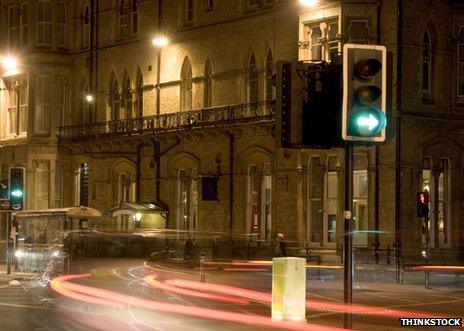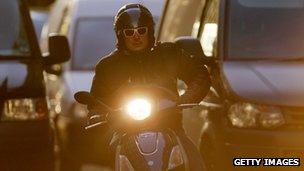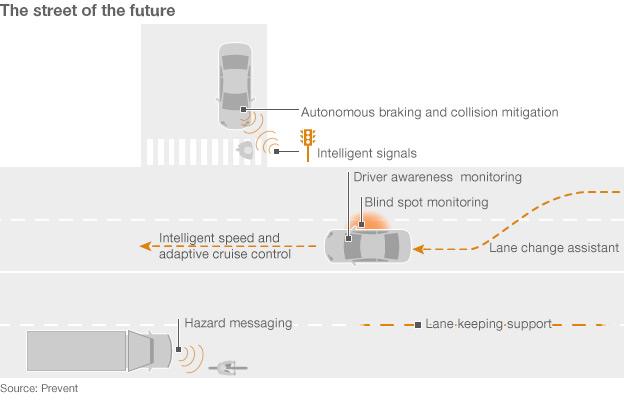Viewpoint: Is it time to get rid of traffic lights?
- Published
- comments

We rely on traffic lights to tell us when to go. And when to stop. We should replace that with common sense, argues traffic campaigner Martin Cassini.
It was a day in Cambridge in 2000 at a road junction where normally I would wait for three signal changes to get through.
This time it was deserted and as I breezed through without incident or delay I saw that the traffic lights were out of action.
From then on I started thinking: "Are we better off left to our own devices and is this huge system of traffic control blocking our progress and making us 'see red' in more ways than one?"
First, the statistics. The latest annual figures show there were <link> <caption>24,500 deaths or serious injuries</caption> <url href="http://www.dft.gov.uk/statistics/releases/road-accidents-and-safety-annual-report-2010/" platform="highweb"/> </link> on the roads in a year in the UK.
The numbers have been declining steadily but it seems to me that a traffic control system that presides over those sorts of figures is still getting something profoundly wrong.
One estimate puts the <link> <caption>annual cost of accidents</caption> <url href="http://assets.dft.gov.uk/statistics/releases/road-accidents-and-safety-annual-report-2010/rrcgb2010-02.pdf" platform="highweb"/> </link> at between £15bn and £32bn and in my view most accidents are not accidents.
They are events contrived by the rules and design of the road.
As a driver, when you see a green light, are you watching the road? You're probably watching the light.
Driving recently, I was about 20 yards away when lights changed to amber and I thought, shall I put my foot down and try to beat the amber.
I knew it would be a long wait at this set of lights.
Luckily I did not. As I stopped, between the traffic light poles a pedestrian appeared. If I had put my foot down it would have been a disaster.
People think traffic lights are a guarantee of safety but the latest audit from Westminster City Council, for example, has shown that 44% of personal injury accidents occurred at traffic lights.
I started filming junctions wherever I found the lights were out of action and filmed after the engineers had got the lights working again.
I started a campaign, now called Equality Streets and initially known as Fit Roads, standing for Filter in Turn. The idea behind it was that we can make roads fit for people by letting human nature take its competent and co-operative course.
Instinctively, we want to be kind to each other, especially out on the road. When you first meet a stranger, unless you're a mugger, you want to be nice to that stranger.
We all have relationships with strangers in their thousands or millions on the road but road user relationships are corroded and corrupted by the system of control which makes us almost have a greater respect for a traffic light than for a human life.
The fatal flaw at the heart of the system is priority. Traffic lights are bad enough - they make us stop when we could go, they take our eyes off the road, flouting the most fundamental safety principle but they are only the symptom of a dysfunctional system.
The unseen spanner in the works is the idea of main road priority. It was introduced in about 1929 when the authorities were trying to work out how to regulate the new form of locomotion - the motor car.
Main road priority licenses main road traffic to plough on regardless of who was there first, including side road traffic and people on foot waiting to cross.
If you're driving along a main road do you even notice that mother with a pram on a traffic island trying to cross the road?
You might notice her but you can't really stop and let her go if there's a 10-ton truck on your tail, especially if there's a green light ahead.
The intolerable conflicts that arise, arise purely and simply from this rule of priority.
So what did they do to solve the problem of priority to enable us to cross the road in relative safety? They put up traffic lights, so they make us "stop to avoid the inconvenience of slowing down", to quote traffic writer Kenneth Todd.
If the lights weren't there, naturally we would approach slowly and carefully and see what other people were doing and filter through, but the traffic lights make us speed up to beat them.
But what about the maniacs? If we had no traffic control, what would happen?
You can't even legislate for maniacs, so why hobble the vast majority with "one size fits all" rules devised to catch the hypothetical deviant?
My solution is to remove the fatal flaw at the heart of the system - the original sin of priority, because once you've removed priority you've removed the need for traffic lights and the need for speed because we're in no rush any more.

Do traffic lights make congestion worse?
We're not rushing to beat that light, we're not stressed out waiting in a queue that's caused purely and simply by that red light.
Traffic volume can be a drama but volume plus control equals crisis. If you're leaving say, a pop concert in a car, the volume of traffic we can live with. What gets our goat is if we're sitting at a red light for no reason other than that it's red.
In Portishead near Bristol where I showed my video, The Case for a Traffic Lights Trial to the council, a trial began on 14 September 2000.
The lights were switched off at a junction where there had been excessive queues and within minutes of the lights being bagged over the queues disappeared.
That trial has gone permanent and <link> <caption>the monitoring has shown</caption> <url href="http://www.colinbuchanan.com/uploads/cms/files/34c021d4-72ad-4d8e-8456-fd256a6cd547.pdf" platform="highweb"/> </link> that journey times fell by over half with no loss of safety.
Various organisations have put the cost of lost productivity to the UK economy as a result of congestion at £20bn so in my opinion traffic system reform is a rich source of painless spending cuts.
<italic>This is an edited version of Martin Cassini's </italic> <link> <caption>Four Thought </caption> <url href="http://www.bbc.co.uk/programmes/b010q0n0" platform="highweb"/> </link> <italic>talk for BBC Radio 4. Hear the full programme on Wednesday, 16 May at 20:45 BST or download the </italic> <link> <caption>podcast</caption> <url href="http://www.bbc.co.uk/podcasts/series/fourthought" platform="highweb"/> </link> .

<link> <firstCreated>2011-12-07T00:53:31+00:00</firstCreated> <lastUpdated>2011-12-07T00:53:31+00:00</lastUpdated> <caption>How close are we to a crash-proof car?</caption> <url href="http://www.bbc.co.uk/news/uk-15820069" platform="highweb"/> </link>
- Published7 December 2011